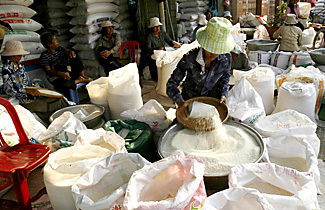Russia’s Drought Raises Bondholder Risk on Prices

A farmer driving his tractor to harvest flax at a collective farm in the village of Mirny, in the Tver region (Reuters)
Russia’s worst drought in a decade will probably generate losses for bondholders as food prices rise and the government may be pushed to tap debt markets for funds to support farmers.
High temperatures, which rose to a record 37.4 Celsius (99 Fahrenheit) yesterday in Moscow, have damaged 32 percent of land under cultivation and forced Russia to declare states of emergency in 23 regions. Grain prices may double this year because of the drought, according to the Grain Producers’ Union.
Inflation may quicken to 8.1 percent by the end of December, compared with the government’s annual forecast of 6 percent, according to Yaroslav Lissovolik, Deutsche Bank AG’s head of research in Moscow. That will put pressure on Bank Rossii to raise its benchmark rate by year-end for the first time since December 2008, said Natalia Orlova, Moscow-based chief economist at Alfa Bank.
Higher rates “may cause a correction in short-term sovereign bonds and, later, in long-term sovereign bonds,” said Evgeniy Nadorshin, senior economist at Trust Investment Bank in Moscow.
The government, which plans to sell 1.2 trillion rubles ($39.3 billion) of bonds on the domestic market this year to finance its budget deficit, may increase that figure to pay for subsidies and contain the drought’s fallout, Nadorshin said.
Read moreRussia: Worst drought in a decade, high temperatures damaged 32 percent of land under cultivation, grain prices may double




